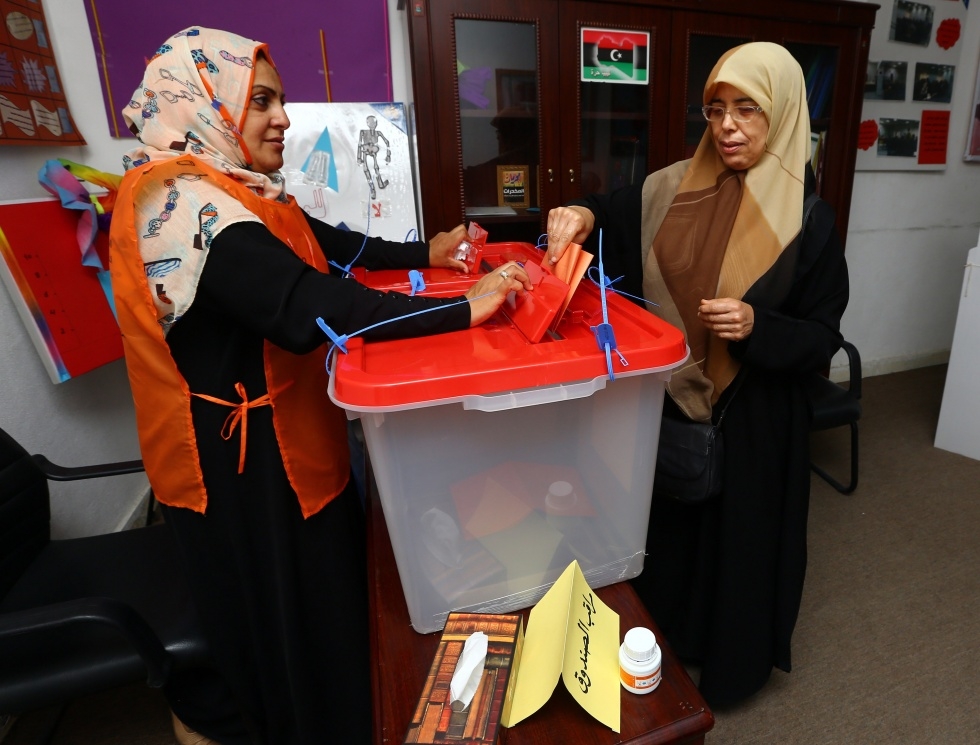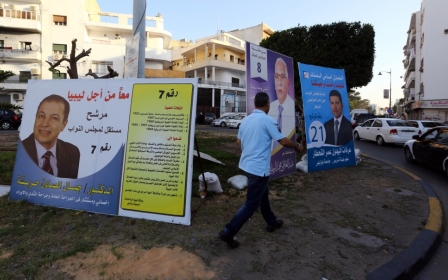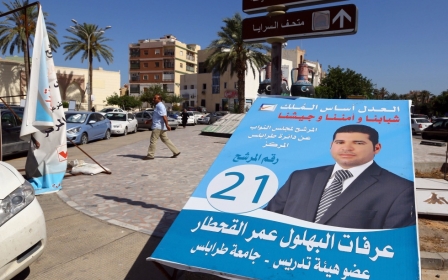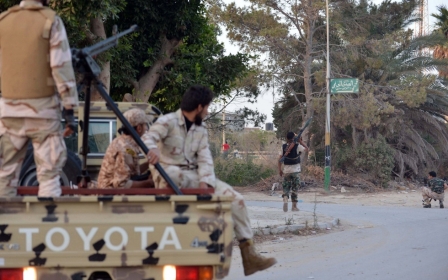Libyan elections a litmus test for country's near future

Libya is heading to the polls on Wednesday, amidst a deteriorating security situation which some analysts have warned could soon decline into all-out civil war.
The last few months have seen a power-vacuum emerge, with three different prime ministers asserting their right to rule, while a rogue ex-general Khalifa Haftar has waged a military campaign against alleged “terrorist” groups in the east. Various militias meanwhile, have vied for power and influence, as the death toll from clashes has edged ever upward.
The energy-rich country now appears to be racing toward economic ruin, as the state struggles to regain control of its resources, and as instability continues to undermine investment. It remains unlikely that voting will take place in parts of the country that are under militant control.
Some are hoping that the election, the second parliamentary vote since former Libyan leader Muammar Gaddafi was overthrown in 2011 after more than 40 years in power, will clear up the current imbalance of power. Others, however, fear that Wednesday’s vote, which was only announced at the end of May, days after Haftar first launched his operation, will merely fuel tensions.
Most agree that uncertainty lies ahead, no matter which way the vote ends up swinging.
“Even people on the ground have no idea what the results will be. There is not enough information,” says Jason Pack, researcher of Libyan history at Cambridge University and President of Libya-Analysis.com. “But it is likely to be a repeat of what we have seen - a large crop of independents with leanings toward the Brotherhood. However, it does appear that the groupings will be less Islamist-leaning because of the frustration of the Islamist takeover of the GNC.”
Younis Ali Lahwej a tutor at Reading University who specialises in Libya, takes this prediction even further: he says that he has noticed people turn away from the Muslim Brotherhood’s Justice and Construction Party, as well as other Islamist-leaning candidates, and predicts that Libya’s so-called liberals will make a stronger showing than in 2012.
“There has been a lot of anger toward the Muslim Brotherhood. They have not listened to the street and calls for the GNC to step down,” says Lahwej. “They may be the only really organised party, but the Libyan people have learned their lesson.”
This frustration, he says, has expressed itself through renewed political vigour that he has seen among expatriate Libyans, who are once again choosing to re-engage in the country’s politics.
“I think that the public at large is putting a lot of hope into this election,” he says. “There is relative optimism and real hope that Libya will escape the impasse, and everyone is banking on the election to get something new.”
Smooth transfer possible?
There have been tentative indications that a smooth transfer of power may be possible. The decision of Ahmed Miitig - who was seen, as allied with Islamist factions in the GNC - to step down as acting prime minister after the Constitutional Court ruled his election unconstitutional earlier this month, helped to temporarily ease tensions, just as they looked like they might reach boiling point.
The Muslim Brotherhood has also sent a host of consolatory messages, and has hinted that it would be willing to share power after the vote, while the UN is pushing for an inclusive unity government that would represent all sides.
“The Justice and Construction Party (JCP) and the National Forces Alliance (NFA) can meet and have a dialogue and share power,” Mohammed Abdul Malik, the LMB’s European spokesperson, told Middle East Eye.
“That is the only way forward for the country. The gap between the two sides is not that wide. If we lay solid democratic foundations together, it doesn’t matter who wins this vote, because the other side will have time to regroup and plan for the future.”
“We will be putting a lot on the table and we need some serious people to broker the dialogue. UN, EU, US some serious people who must put it in both our heads that we must power share.”
But while it may be too early to give up hope that the election will prove to be a positive turning point, cracks have already appeared in Libya’s electoral fabric, and Libya continues to have a host of internal and external factors working against it.
“The desire to not have political parties participate means that we are going to see a repeat of the deadlock at the GNC, which will mean it will be almost impossible to get a consensus, no matter who is going to be elected,” says Pack.
Only some 80 seats out of 200 in the GNC were reserved for parties, while the rest went to independent candidates. The policy was designed to counter authoritarianism after decades of Gaddafi rule, but many have blamed this structure for creating chaos and confusion. This time, all seats in the House of Representatives, have officially been allocated to independents, which could further complicate matters.
Voter registration down
Voter registration is almost half of what it was back in 2012, and concerns are high that turnout will be disappointing, despite the authorities declaring an all day holiday. Only 1.5 million out of a possible 3.4 million eligible voters have registered, compared to 2.8 million in 2012.
Back then, some 60 percent showed up to cast their ballots, but this figure fell to 50 percent of the one million registered for the constitution-drafting assembly elections or just 15 percent of all those who were eligible.
Various factions have called for an election boycott, while hundreds of thousands of Libyans remain displaced in neighbouring Tunisia and Egypt, and feel they have been utterly disenfranchised by the current system.
“Who is seriously going to vote in this election? There is no election, this is just propaganda,” says Mohamed Gaddafi Eddam, who has started a controversial opposition movement in exile that aims to overthrow the current government by force to install what he says will be a more democratic government that will crack down firmly on foreign militants.
“Everyone knows that the vote will do nothing. Libya is a jungle where people do not feel safe. It is a ghetto. The Libyans are really suffering and people are afraid. People were afraid under Gaddafi, and they are afraid now.
“Post-revolutionary Libya is new-born baby that is dying,” he adds, while saying that the people have been left with no real choice and are left stuck between radical factions on the one hand and corrupt Gaddafi-era officials on the other.
“The hope after the revolution in 2011 is gone. So after the second revolution era, we have gone back again to the dark days of Gaddafi,” says Eddam, who is related to and hails from the same tribe as the former dictator, although he came to prominence for speaking out against the regime and urging Libyans to rise up – a feat which caused him to be disavowed on television by the rest of his family.
Even for those with a more positive view of the current system, however, serious concerns remain.
The Brotherhood’s Malik, who says that the JNC still expect to make slight gains on their 2012 showing, also fears that the vote may be used as an excuse to launch an all-out crackdown on opposition parties.
“The NFA thinks that they will win and that Haftar will win,” he says Malik. “If NFA get a majority then what Haftar is doing will be endorsed by the authorities.
“But even if the election doesn’t (bring in people to their side) that will encourage them to go further and further increase their bombing of Benghazi.”
Such a policy can only spell ruin for Libya, Malik believes, and could further accelerate the rise of militant movements, such as Ansar al-Sharia and al-Qaeda-linked groups, and propel a further disintegration of the country into tribal factions and warring militia groups.
“Up until now, no one has been able to stop these people using force – not even America,” says Malik who advocates using the brotherhood as a bridge between the more secular parties and radical groups.
Imbalance, a saving grace?
But this military and political imbalance might actually prove to be one of the few things capable of saving Libya.
There appears to be a common thread uniting analysts and politicians of different stripes. For now, all sides feel capable of winning the conflict and shifting the balance in their favour, explains Malik. Though once it becomes clear that none of the factions have the resources or the support to rule over the entire country, made up of hundreds of tribes and countless small political factions, the drive to cooperate and finally reach a true national consensus could emerge, he added.
“Haftar remains unpopular, but his enemies are even less popular,” says Pack.
“Libyan politics at the moment are conceived as a zero sum game between two or three larger factions. Until those factions are ready to negotiate behind the scenes and come to a grand bargain, it is not possible for there to be any unifying figures.”
However, if a grand bargain is somehow struck behind the scenes, the new House of Representatives may finally find itself empowered and acting at long last to reach into local communities and bring unity, explains Pack.
“If that miraculously happens, the elections will be a great success, and it won’t have mattered that turnout was low," he says. "If the body is empowered to act in a legitimate fashion, that will be amazing.”
New MEE newsletter: Jerusalem Dispatch
Sign up to get the latest insights and analysis on Israel-Palestine, alongside Turkey Unpacked and other MEE newsletters
Middle East Eye delivers independent and unrivalled coverage and analysis of the Middle East, North Africa and beyond. To learn more about republishing this content and the associated fees, please fill out this form. More about MEE can be found here.




